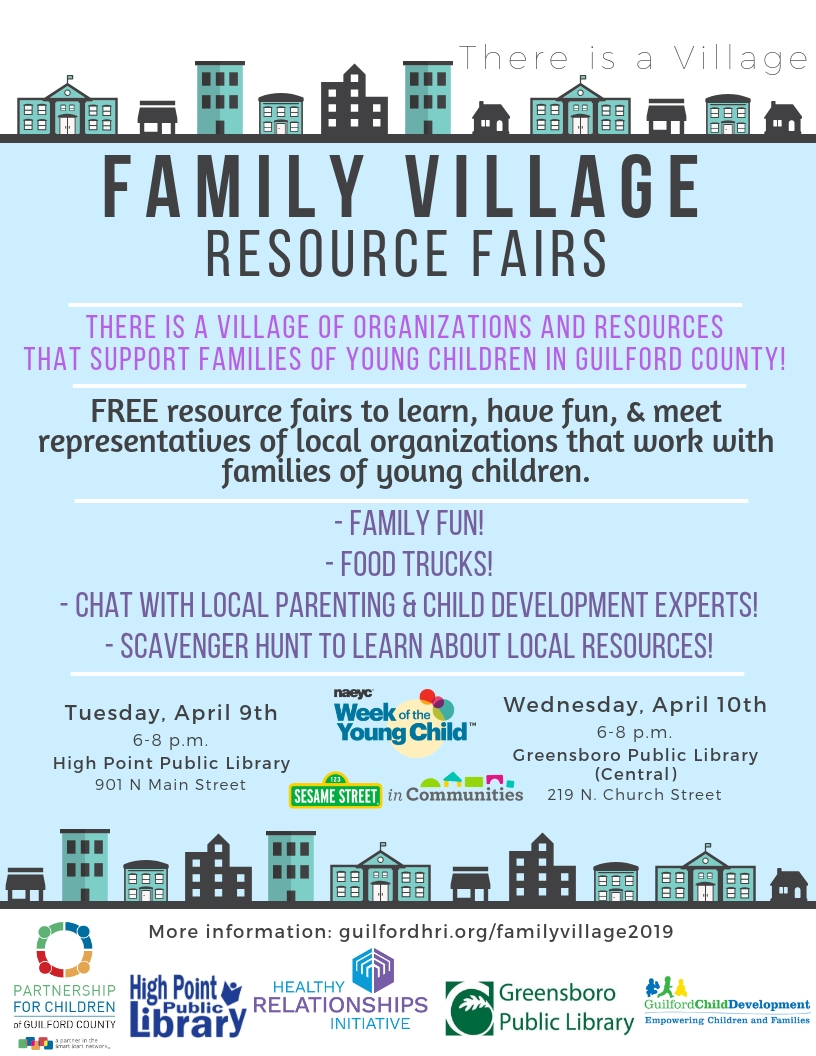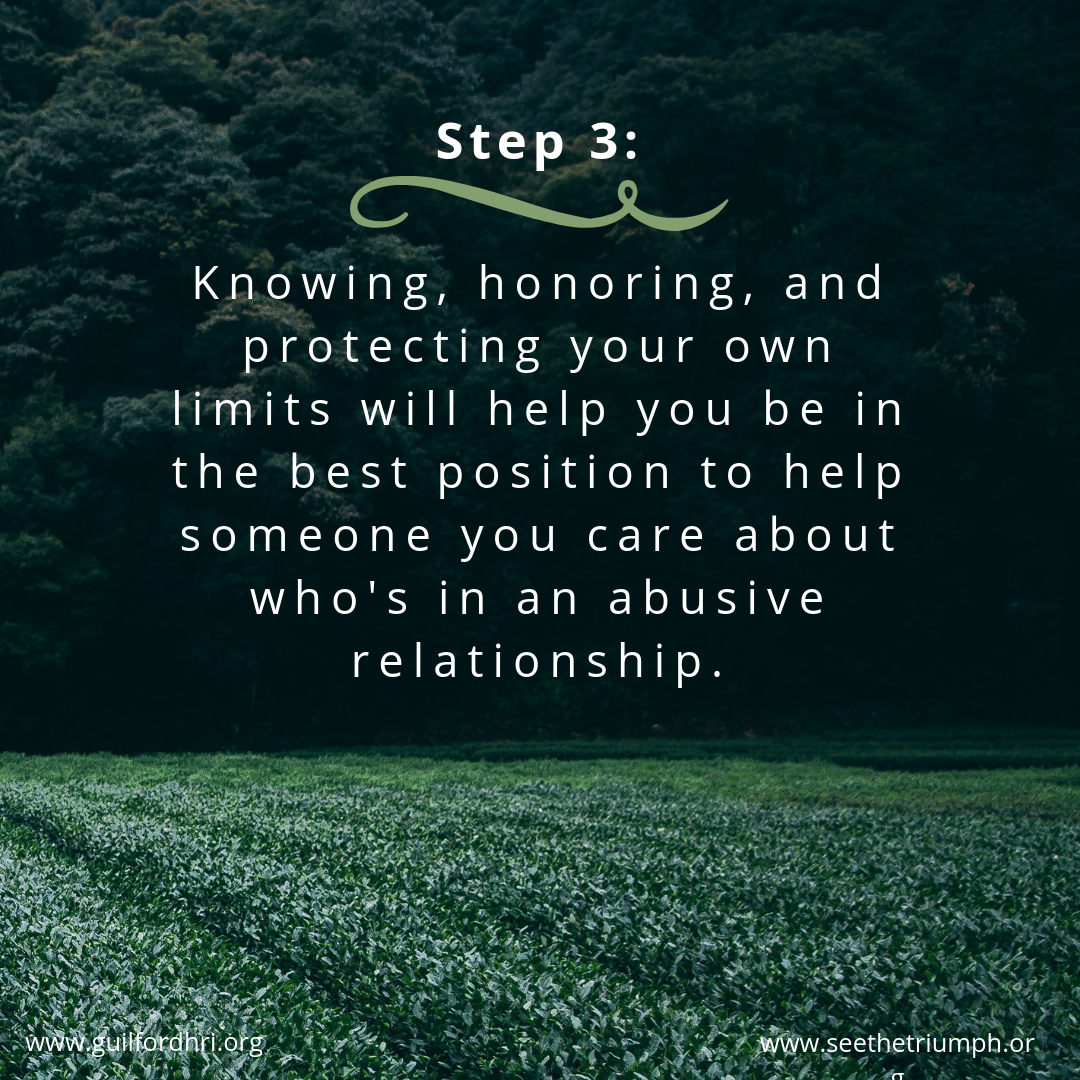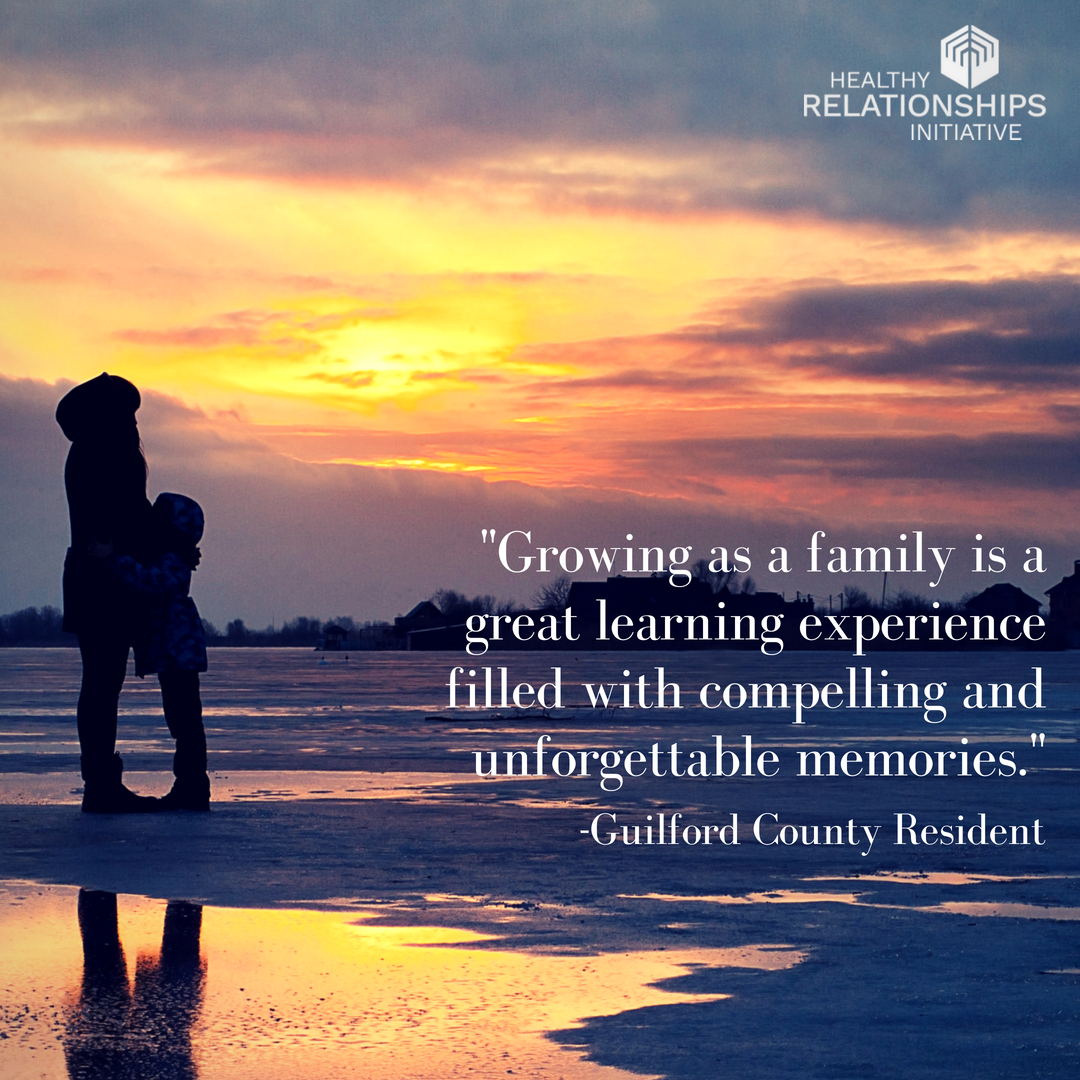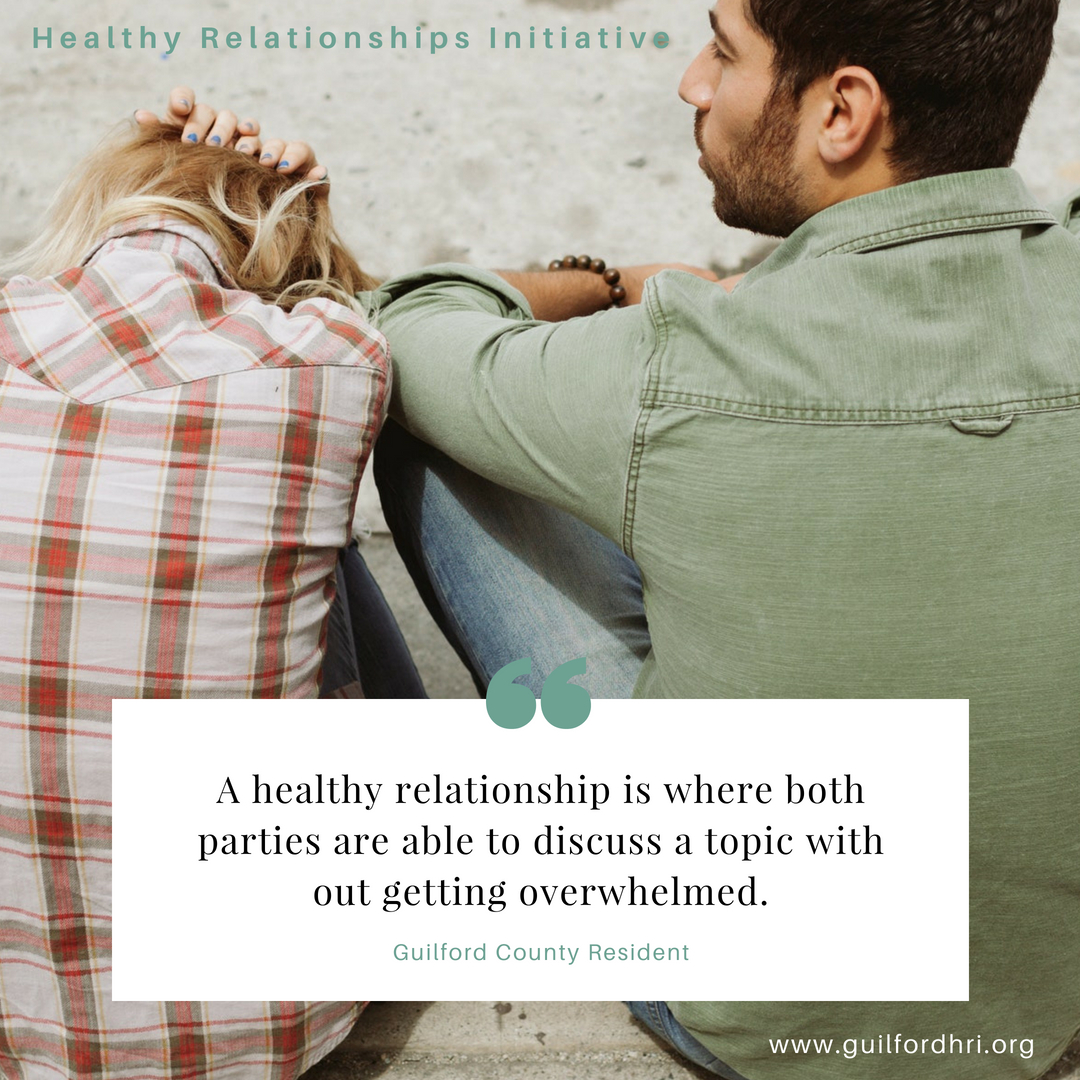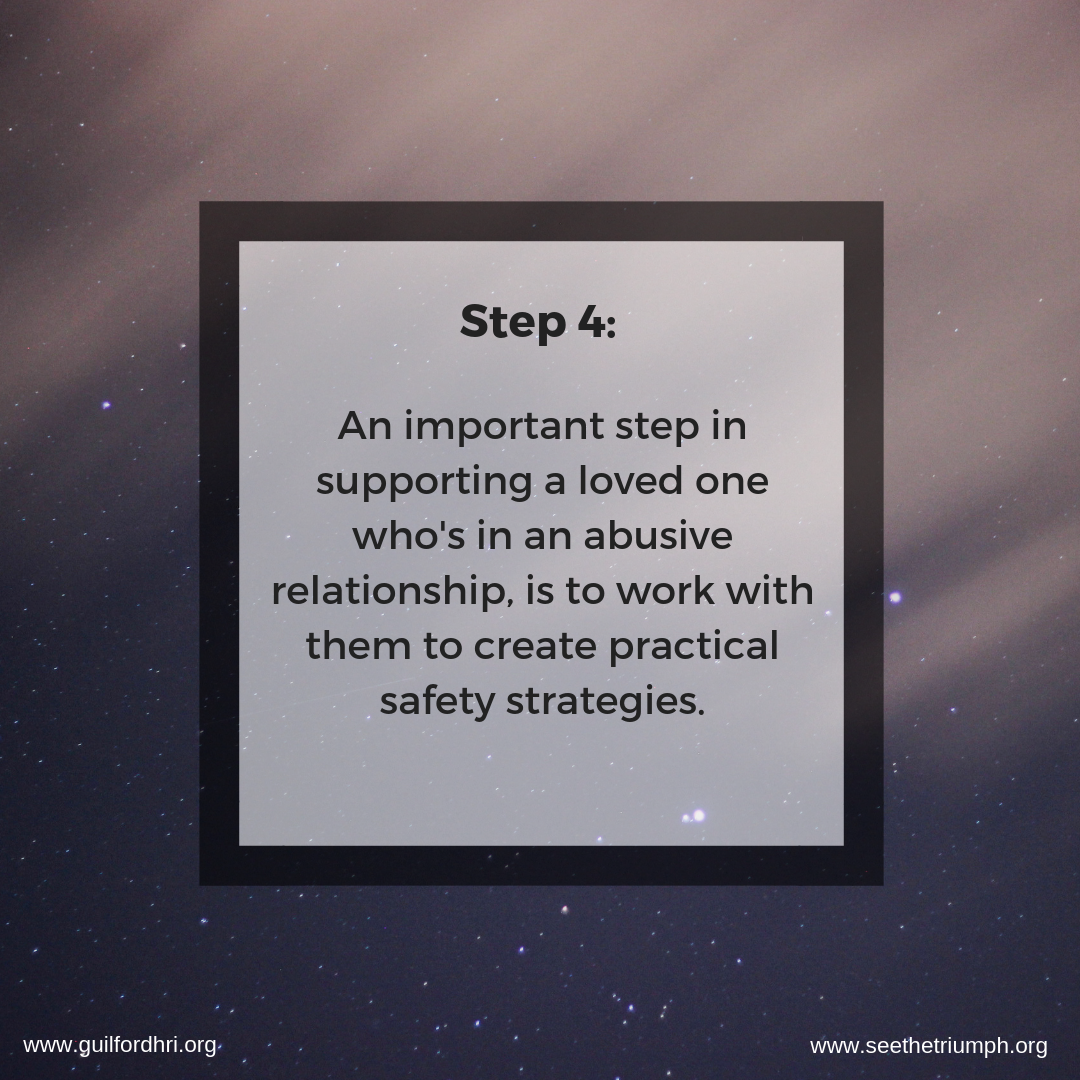
What can you do to help someone in an abusive relationship become more safe? As we’ve discussed in the first 3 blogs in this series, important considerations in answering this question for a person in your life are:
- #1: Avoid judging them or imposing your own views on this situation.
- #2: Ask them how you can best help them, and respect their wisdom and knowledge of the situation.
- #3: Be sure you are caring for your own safety while you’re also looking out for theirs.
With these 3 considerations in mind, there are several practical steps that you could take or help them to take on their own to promote their safety. Through her Family Violence Research Group at UNCG, Dr. Christine Murray studied safety planning from professionals who work daily with victims and survivors of intimate partner violence. Based on what they learned through their research, Dr. Murray and her colleagues created the Safety Strategies Guidebook for professionals to use when doing safety planning with clients impacted by intimate partner violence.
Although Safety Strategies was designed to be used by professionals, it contains several examples of the types of safety strategies that can be used to address some of the major risks that survivors face in abusive relationships. Based on the Safety Strategies Guidebook, the following actions are examples of the general strategies that could potentially be used to help promote safety in the context of the some of the risks involved in an abusive relationship. The word potentially is important to highlight, as each person’s situation is unique, so it’s important to consider whether each particular strategy would be relevant, safe, and appropriate for each person.
Risk: Leaving an abusive relationship
Sample safety strategies:
- Know what local resources are available for support and how to get in touch with them.
- Keep an emergency bag packed for your friend in case they need to make a quick escape. Include copies of important documents, prescriptions, and cash.
- Plan ahead for how and when your friend would be most likely to be able to leave the relationship safely.
- Plan to ensure that transportation is available when your friend is ready to leave.
- Ensure that your friend’s partner cannot track their location through the GPS on their phone, car, or other electronic devices.
- Go with your friend to get trained in self-defense skills.
- Plan for a safe place for your friend to stay immediately after leaving. Know the eligibility requirements of their local domestic violence shelter, as well as any other shelter options that are available.
- Plan for the safety of any involved children and/or pets.
Risk: Staying safe during a violent incident
Sample safety strategies:
- Help your friend develop an escape plan from different areas of the home
- Encourage your friend to trust their instincts, even if it means doing something different than what is listed in their safety plan.
- If they are injured, encourage them seek medical attention as soon as possible.
- Identify if there are any areas in their home that would be safer than other areas. If possible, suggest that they try to move to those areas during the abusive incident. Also, if at all possible, suggest they try to avoid rooms where weapons are located or rooms with a lot of hard surfaces.
- Plan for where in their home they could call for help. They may be able to pre-program their cell phone with emergency numbers, but consider if they should re-label these so that they are listed under a code name.
- Know how to reach your local emergency services. Although this is 9-1-1 in many communities, some communities have other numbers for seeking emergency assistance.
Risk: Keeping children safe in the context of parents’ abusive relationships
Sample safety strategies:
- Know the requirements for reporting abuse if there are children who witness it. In many areas, this is required to be reported.
- Consider the child’s age and developmental stage when discussing any possible safety plans with them.
- If appropriate, help children practice calling 9-1-1 (or their local emergency assistance line) and providing information to help the first responders know the location of the home.
- Help children connect with supportive professionals, such as counselors, who can help them process and cope with their emotional responses to the abuse.
Risk: Stalking
Sample safety strategies:
- Suggest that they avoid, whenever possible, reciprocating any communications with someone who is stalking them.
- Help them to keep ongoing documentation of any contact that the person who is stalking them makes or attempts to make. Keep copies of e-mails, voice mail messages, text messages, and letters, as well as photos of any other evidence of the stalking.
- Help your friend plan on ways to avoid being alone.
- Assist your friend in learning about options for seeking a protective order.
- Report suspected incidents of stalking to your local law enforcement agencies.
- Consider changes they could make to their daily routines to make it more difficult for the stalker to track them.
Risk: Enforcing a domestic violence protection/restraining order
Sample safety strategies:
- If they don’t already have a protection order, consider learning about how to apply for one in their community.
- If they have a protection order, know the terms of it. Know how to report any violations. Make sure your friend knows and understands these terms.
- Encourage your friend to keep copies of the protection order in a safe place. Consider who else in their life who should have a copy and know how to report violations. This may include their neighbors, their workplace or school, their children’s school, or other caregivers of their children.
Risk: Abuse through technology
Sample safety strategies:
- Suggest that your friend change their passwords to ones that their abuser doesn’t know and isn’t likely to be able to guess.
- Help your friend learn how to delete their history in their Internet browser, especially if their are using the Internet to learn information about domestic violence or resources in their community for getting help.
- Suggest that they use their Internet browser’s “Private Browsing” mode.
- Help your friend consider carefully anything they post on social media. They may need to disconnect from social media altogether for a time if their abuser is using it to gain information about them.
- Learn about the privacy of their cell phone or smartphone, and help them take steps to be safe using these forms of technology.
- Document any instances of abuse or threats their partner makes via technology.
Although it may be impossible to plan ahead for any possible threat that could arise, engaging in a safety planning process is useful for identifying proactive strategies that your friend or family member can use–with your support–to move toward greater safety in the context of an abusive relationship. We suggest you and your loved one work with a professional–such as a victim advocate or trained counselor–to further enhance the safety planning process.
When it comes to supporting someone in an abusive relationship, remember this: Think Safety First! There are many practical steps that you can support your loved one in taking to increase their safety and address many of the risks they face. By helping your friend or family member identify these steps, you can help them to feel empowered to know that, even within their abusive relationship, they have options and can take action to become safer.
This information has been adapted from materials in the How to Help a Friend Collection from See the Triumph. Visit See the Triumph at www.seethetriumph.org for more information.

